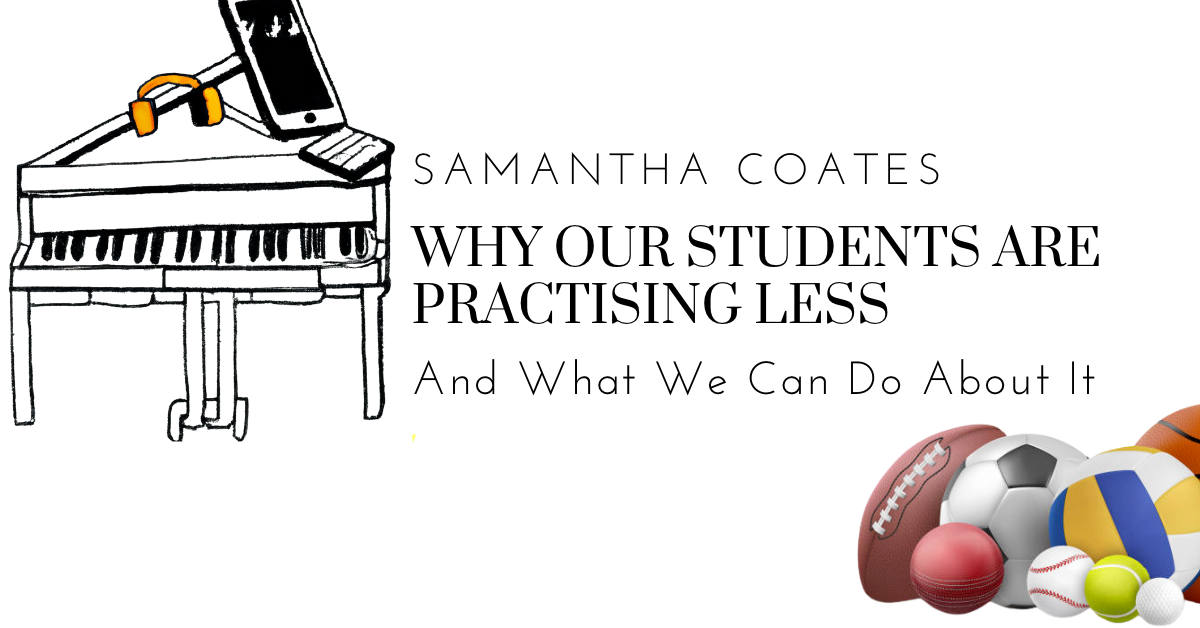
Do your students practise enough?
Mine don’t.
There, I said it! My students don’t practise1. And by ‘don’t’, I mean ‘hardly’. And I’m talking about my student base as a whole; whilst I have one or two students who work a bit harder, overall there is definitely not enough practice going on.
But here’s the really great thing: I have stopped getting upset about it.
Before I pass on my secret2 to how we can all be less upset and we can all help our time-poor students to feel better, I can tell you that I am a normal piano teacher with normal self-esteem issues. I feel intimidated when I see videos of amazing young pianists. I think to myself, ‘Wow, there’s a LOT of time invested in that piece… how come none of my students practise that much?
In my studio, the lack-of-practice problem has been getting steadily worse over the past 5-10 years, and every teacher I speak to is finding the same3. So, WHY are students practising less? Are they less interested? Is piano less appealing? Do students think they can just do it without practising as much?
I don’t think so. In the demographic in which I teach, there seem to be three main reasons:
- They have no time.
- They have hardly any time.
- They are time-poor.
My students barely have enough time to attend their lessons, let alone practise piano at home. They’re coming to me in a tight window of their day, sandwiched between school and tutoring, or tutoring and swimming, or any number of extra-curricular activities. The teenagers especially seem permanently tired, and they are barely through the front door before they’re apologising that they ‘haven’t practised much.’4
Ok, so what can we do about this? I think there are two strategies we can employ.
The first is to evolve our expectations, and the second is to change the language we use with our students.
- I personally feel there are too few teachers who will admit to this!
- It’s no secret, that’s just normal clickbait-y phrasing. Wait til you read the end of this article! 😊
- Except for the ones who won’t admit it.
- This is a euphemism for ‘I haven’t touched the piano this week.’
A Caveat
I should probably mention that none of my students do exams, except for those doing HSC (final year of high school). I know many teachers who are sometimes at breaking point with students who are going for an exam and not putting in the required practice. That’s a really different situation and one that needs careful handling.
I should also say that I have a thorough onboarding system, so all of my students have supportive parents and understand the importance of practice. This article is not about how to deal with lazy students; it is about how to retain our lovely, well-intentioned students who cannot fit in the amount of practice we would all like.
Evolving our Expectations
Whilst it’s wonderful when students show up having practised, these days I’m simply delighted that they show up. I have a stack of activities up my sleeve, all with huge learning curves, and the lesson is always stimulating and challenging. In fact, I’m often secretly delighted when they haven’t practised, because it means we get to do things we never usually have time for!
I use my rote repertoire series almost every lesson, with every student – it is the best way to simultaneously cover sight reading, aural, theory, and creativity. I never repeat content from the previous week, unless the student specifically asks for this.
The mantra in my head is this: Slow progress is still progress. They learn more being here than not being here, regardless of what’s going on at home. As long as the student understands and accepts that progress will be slower with less practice, and the parent’s expectations are also managed, everyone is happy.
Changing our Language
I never start off the lesson asking them how much they’ve practised. After the initial icebreakers, I might ask ‘what piece did you enjoy the most this week?’ or ‘did any of your pieces give you some trouble this week?’ or even ‘if you had had more time, what would you have wanted to play?’
With teens and adults, who are the main apologists, I say things like ‘I am not here to judge you.’ I know they’re doing what they can, when they can. I want them to think of their lessons as problem-solving sessions, and I do not want them to feel guilty. When we start the lesson, I might say ‘which problem areas would you like to work on today?’
I try not to make judgments on the difficulty level of pieces. Instead of saying ‘this piece is too hard’, I’ll say ‘this piece has lots of technical issues and it does take time to learn.’ Talking about how much time investment the piece needs is more helpful for the student. Rather than suggesting pieces that are ‘easier’ we can use words like ‘more accessible’ or even ‘achievable in your preferred time frame’.
I think the best line I’ve ever come up with is the one I use for my HSC students, who often aspire to pieces that are way too time-consuming to learn. I tell them: ‘You are totally capable of learning this piece. The problem is not your ability. The problem is your AVAILability.’
In Conclusion
Since this problem is not going away, we need to evolve and change with the culture. In this way we can not only retain our students, but help them to grow up to be holistic musicians who remember their piano lessons with a smile on their face.

Samantha Coates is an internationally regarded piano pedagogue and presenter. In addition to running an active teaching studio, she is the creator and publisher of BlitzBooks, the music education series that has brought laughter and creativity to music theory, sight reading, and piano repertoire. Samantha’s sense of humour and ability to connect with students through her books and online resources reflect her ongoing dedication to making all areas of music accessible, enjoyable and memorable.
